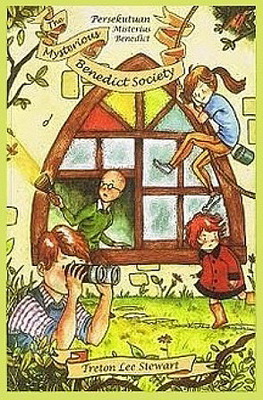
Children’s literature, to my thinking, is always about fairy tale, what with its good-vs-evil idea, black-and-white characters, and happy ending eternity. That’s pretty much what I perceive the genre to be. It’s never in my nature to read children’s books, other than Harry Potter series, and I know I cannot be judgemental about it, but I can’t help thinking so. And The Mysterious Benedict Society by Trenton Lee Stewart only strengthens my preconceived opinion. First published in 2007, it talks about a group of lonely children who have to give their best to save the world from an unknown evil. The idea seems too extravagant, and not being expressed in an impressive narrative, but fortunately Stewart executes it quite well at the end. Also, it has the right atmosphere to suck the audience into its adventurous world.
Reynie Muldoon, a lonely orphan ignored by everyone but his private teacher, takes a mysterious test he’s seen advertised in a newspaper. He thinks it will be a great idea to join something, to prove something, and to get to be a part of something, something which then gets him encountered some new friends, George “Sticky” Washington, Kate Wetherall, and Constance Contraire. Together, they pass the test and found the Mysterious Benedict Society, led by the mysterious Mr. Benedict. Their secret mission is to save the world from a certain wicked plan of rearranging it. They are to enter the Nomansan Island as normal students and learn everything in it, secretly stealing any clue about the “rearranging plan” and do something to stop it. Inside the school, they find the students and the people awkwardly weird, sort of brain-washed and wrongfully trained. Their own plan is almost ruined when Mr. Curtain, the handicapped, evil leader of the school, catches them in the act. But, amazingly, being kids as they are, Reynie, Sticky, Kate, and Constance manage to fight the ambitious scientist with their brains and friendship.
Mr. Stewart indeed gives some good reasons why it should be an orphan to take such a dangerous mission as saving the world from evil, and thus the story seems so logical. Had I not related it too much to Harry Potter, I wouldn’t have thought the main character was created in the same style. But when I perused the character of Reynie Muldoon and the whole thing he has to go through, my thoughts couldn’t help but race back to Harry Potter. I won’t make any accusation here, so I will only blame it on my limited reading experience. Luckily, the characterizations of Kate, Sticky, and especially Constance have unbearably caught my eye. They seem not ordinary to me, not so innocent, not so “white”, full of rage and longing of a truly lost little child. They somehow complete the lack in the character of Reynie, and are the souls of the story. The best part of the character department here is how Stewart describes Mr. Benedict and Mr. Curtain. I’m not talking about their good and evil natures, but how Stewart describes their unusual kinks and weaknesses. They put richness in those two opposing brothers and render the whole package of characters less boring.
Through this book, Stewart has actually come up with a brilliant thought where he believes that children are often underestimated, not worth listening to, not worth taken seriously. Here, Stewart wants to project children as young people who can do something, namely saving the world in danger. No matter how exaggerated that idea and its realization within the frame of this book seem to be, to my mind, it’s still good thinking. Only it is not completely well-written. The beginning of the story runs pretty impressive, so mysterious, so secretive, so well-plotted. But then it drags too terribly long that I just got the core idea almost in the middle of the book. The next thing you know, the story seems to run at a double-time pace to the climax. The development of the narrative doesn’t go along well with the steady development of each character. So while the portrayals of them seem outstanding, the narration of what’s happening along the book seems to flop. Fortunately, the climax and the ending are quite satisfying, prodding me into wanting to read the next in the series.
Overall, I can say that The Mysterious Benedict Society is an enjoyable read, such a shame I didn’t get anything from it except a fun adventure and some floppy plot with an extravagant idea in it. This book lacks many great aspects, and some of the good ones are only represented in an ordinary way.
Rating: 3/5